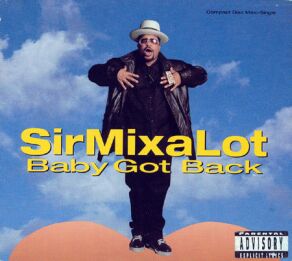 | Baby Got BackSir Mix-A-Lot |
Writer(s): Sir Mix-a-Lot (see lyrics here) First Charted: April 11, 1992 Peak: 15 US, 14 CB, 29 GR, 13 RR, 27 RB, 56 UK, 89 CN, 8 AU, 12 DF (Click for codes to charts.) Sales (in millions): 4.08 US, 0.2 UK, 4.31 world (includes US + UK) Airplay/Streaming (in millions): -- radio, 60.0 video, 202.14 streaming |
Awards:Click on award for more details. |
About the Song:Rapper Anthony Ray (stage name “Sir Mix-A-Lot”) was born in the Seattle area and became a DJ and regional rap star in the ‘80s before leaping into the mainstream with “Baby Got Back,” “a proudly horny and single-minded piece of music” SG that become “a sort of cultural flashpoint.” SG The inspiration from the song came from a Budweiser commercial during the Super Bowl. He said each of the models was “shaped like a stop sign, with big hair [and] straight-up-and-down bird legs.” SG He preferred women like Jennifer Lopez, who was a dancer on TV’s In Loving Color at the time. SF Producer Rick Rubin, who “made his name as a bare-bones rap producer,” SG started his own label, Def American, in 1988 and signed Sir Mix-A-Lot. Rubin saw potential in the “the joyously ridiculous” SG “Baby Got Back” as “a fast, uptempo club track…a real hit” SG even though the rapper didn’t see it as a single. Rubin accommodated the rapper by releasing “One Time’s Got No Case,” “a song about racist police harassment,” SG but when it failed, “Baby Got Back” was released as the second single. Rubin’s instincts proved correct as the song sailed into the stratosphere, topping the Billboard Hot 100 for five weeks.
One could “make a case that ‘Baby Got Back’ is the biggest Miami bass hit of all time” SG but “as a producer, Sir Mix-A-Lot also understood house and techno.” SG The song “is hard and propulsive, but it’s also simple and weirdly accessible.” It “doesn’t really have a chorus. It doesn’t need one, since virtually everything that Mix-A-Lot says is a hook.” SG
Of course, the video helped immensely as well. “It’s basically a live-action Bugs Bunny cartoon” SG that “makes an already funny song even funnier.” SG The fact that it was initially banned at MTV only added to the song’s popularity. SF Some saw the song as just a novelty hit, but it also became “a political statement” SG in which the rapper railed against conventional beauty standards and, as he said, “the lack of acceptance by Hollywood of the African-American body.” SF It touched off actual debate: “Was Mix-A-Lot objectifying women or was he celebrating them?” SG The short answer? Both.
|








No comments:
Post a Comment